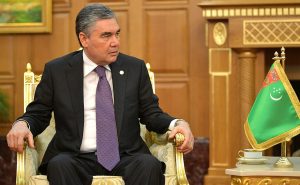The potential for Turkmenian natural gas flowing westward to Europe appears great at first glance: The European Union (EU) wants a stable and diverse range of suppliers to reduce its dependence on Russia, from whom it receives nearly half its imports. Several times in the past decade, Russia has stopped the flow of natural gas to Ukraine, which affected EU members because of the significant volume of natural gas imports that were piped through Ukraine. Turkmenistan has substantial gas that it would happily trade to Europe, given its worst economic crisis in decades. Europe, which needs to import nearly 80 percent of its natural gas, has implemented legal policy to ensure diversification of its energy markets. The EU would like to reduce its dependence on Russian gas because of concerns over the reliability of Russian supply to the European market. While Azerbaijan is now supplying the European natural gas market via the Southern Gas Corridor (SGC), its holdings pale in comparison to Turkmenistan, which sits on the fourth-largest natural gas reserves in the world. Natural gas export revenues account for nearly half of Turkmenistan’s overall export revenue. Natural gas is Turkmenistan’s only marketable commodity, and the country is a top natural gas producer and exporter in the world. Regional competition in the Caspian Sea, however, has limited Turkmenian economic capacity, and the dichotomy in the core values between the Turkmenian regime and the EU present substantial obstacles to the construction of a pipeline long before Turkmenian gas enters the European energy market.
Regional Competition
Although Russia was the top buyer of Turkmenian natural gas until 2010, pricing disputes and lower demand led Russia to reduce, and eventually halt, Turkmenian gas imports in 2016. Moscow only resumed importing smaller quantities in April 2019, but still wields significant power over Turkmenistan in the Caspian Sea. The prospect of Turkmenian gas flowing to European energy markets relies on the conceptual Trans-Caspian Gas Pipeline (TCGP). First suggested by the United States in 1996, the TCGP would deliver Turkmenian gas across the Caspian Sea into the SGC pipeline network for terminus in Europe. Russia and Iran have signaled that they would block Turkmenistan from building the pipeline, citing ecological concerns. The more likely reasons are that neither country would receive transport revenues, and they are focused on securing their own gas supplies to Europe. The official status of the Caspian Sea matters in this context. In 2018, each of the Caspian nations agreed to classify it as a sea, meaning that each country receives exclusive mineral extraction rights out to 15 nautical miles and fishing rights out to 25 nautical miles, the rest of the Caspian being considered common use. But the delineation of the Caspian seabed, which has the vast majority of the oil and gas reserves and is the leading cause of disputes among the Caspian nations, will require additional agreements and bilateral treaties. Until these are ratified, Turkmenistan’s ability to exploit Caspian resources remain limited.
Turkmen Economic Capacity
With hydrocarbon exports recently accounting for 91 percent of Turkmen exports, Turkmenistan has negligible economic diversity. Companies would be taking serious risks in investing in a major Turkmen pipeline. Under the regime of Gurbanguly Berdymukhamedov — a former dentist with a cult of personality that rivals that of Kim Jong Un — rampant corruption, state interference, appropriation of assets, and investor abuse remain major hurdles to foreign investment. The Turkmen economy is among the least free in the world. It attracted just under $2 billion in net foreign direct investment (FDI) inflow in 2018, despite its significant natural gas potential. In context, war-weary Ukraine received almost a half-billion more dollars in FDI than Turkmenistan. Turkmenistan would require major investment for its pipeline. As a baseline, the SGC pipeline required $45 billion in investment to move Azerbaijani gas to Europe. Unlike Azerbaijan, which received substantial tranches of investment from the European Central Bank and the Asian Development Bank, Turkmenistan is unlikely to receive loans from any country other than China. The Chinese Belt and Road Initiative (BRI) volume of gas trade with Turkmenistan has peaked. Turkmenistan’s entrance into the European market would only yield a profitable rate of return on investment if global gas supply decreased and gas prices returned to pre-2008 global financial crisis levels. But production in the United States and Middle East is surging, not declining.
Core EU Values
The EU is concerned that an authoritarian leader such as Vladimir Putin will leverage its commodity dominance as a tool of foreign policy. A trans-Caspian pipeline carrying Turkmenian gas could theoretically reduce this leverage. Even if such a pipeline existed, however, European states would need to come to grips with the reputation of their new energy supplier undercutting their stated values: respect for human dignity and human rights, freedom, democracy, equality, and the rule of law. Russia and Azerbaijan rank poorly in democracy and press freedom metrics, but Turkmenistan ranks even lower, including a dead-last ranking in press freedom.
Regional competition from its powerful neighbors around the Caspian Sea will hamper Turkmenistan in the near future. Even if Turkmenistan had no geopolitical hurdles, its lack of economic capacity and terrible investment climate will prevent the construction of a pipeline. Last, the EU requirement for energy diversification may not be strong enough to make EU members to reconsider their core values. In theory, Turkmenistan could be a complementary trade partner for Europe’s energy security needs. In practice, the partnership is a pipe dream.
T.J. Sjostrom is a research associate at the Institute for Defense Analyses and a research intern for BMB Russia. He can be found on Twitter @sjostromtj

































